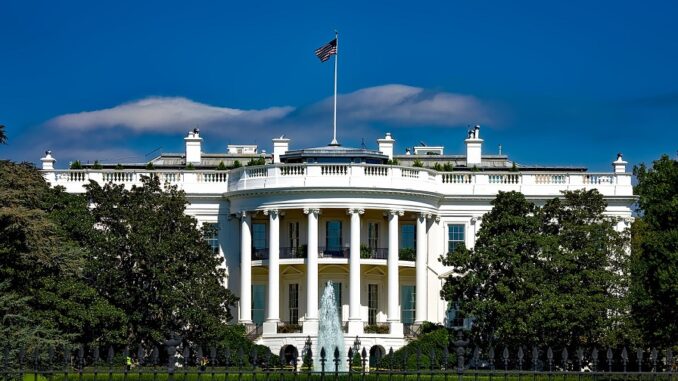
The White House is stepping in. Started at the bottom, now we’re “a matter of national security.” According to Barrons and Bloomberg, the Biden administration is putting itself in the middle of cryptocurrencies and Bitcoin regulation. Apparently, the White House will get input from several agencies and then draft a centralized all-encompassing policy. It’s “a matter of national security,” after all.
Related Reading | The SEC Will Not Ban Crypto, That Would Be Up To Congress, Says Gary Gensler
What does all of this mean? That’s what we’re here to explore. With the limited information available, that is.
The White House Wants To Regulate What?
According to Barrons, the White House wants clarity around Bitcoin, “cryptos, stablecoins, and NFTs.” More specifically:
“The Biden administration is preparing to release an executive action that will task federal agencies with regulating digital assets such as Bitcoin and other cryptocurrencies as a matter of national security.”
Bloomberg elaborates on the idea and lets us know how advanced this plan really is:
“Senior administration officials have held multiple meetings on the plan, which is being drafted as an executive order, said the people. The directive, which would be presented to President Joe Biden in the coming weeks, puts the White House at the center of Washington’s efforts to deal with cryptocurrencies.”
Both publications talk about “the people” or “the person,” and admit that the White House refused to comment. However, it all sounds set in stone. Barrons source told them, “This is designed to look holistically at digital assets and develop a set of policies that give coherency to what the government is trying to do in this space.” Also, “Because digital assets don’t stay in one country, it’s necessary to work with other countries on synchronization.”
According to the publication, the agencies involved are: “The State Department, Treasury Department, National Economic Council, and Council of Economic Advisers,” and “The White House National Security Council.”
BTC price chart for 01/28/2022 on Bitfinex | Source: BTC/USD on TradingView.com
What Does This Mean For The SEC?
The big loser in all of this seems to be Gary Gensler. The Securities and Exchange Commission that he leads is, or used to be, in charge of everything related to cryptocurrency and Bitcoin regulation. The White House‘s new plan seems to bypass the organization, in search of an all-encompassing nationwide policy. Is this a good idea, though? At the very least, Gensler is well versed in the subject at hand. What did he do to upset the applecart?
Barrons again:
“Various agencies oversee the industry, including the Securities and Exchange Commission and the Commodity Futures Trading Commission. But there’s no consensus on matters such as whether some tokens should be registered as securities, or how to oversee exchanges, stablecoins, and high-yield lending products.”
Maybe the White House is not pleased with Gensler’s judgment? According to Bloomberg, “Some of those tasks will be meant to ensure that the U.S. remains competitive as the world increasingly adopts digital assets.” Is the White House looking to relax the Securities and Exchange Commission’s policies? That would certainly surprise the world. We wouldn’t count on it, though.
Related Reading | Biden Administration Drafting Bitcoin Regulation, Why It Could Be Approved Soon
At the end of their article, Bloomberg poses another possibility:
“A CBDC could be a way for the U.S. to stay competitive with the explosive growth of private cryptocurrencies and coins produced by other nations, including China. The Fed said it does not intend to move forward without the support of the White House and Congress.”
Is the White House paving the way for their CBDC? Do they not see the immense advantage that the US-based stablecoins already have in the market? Are they as clueless as Bloomberg in thinking that a CBDC will allow them “to stay competitive”? That certainly wouldn’t surprise the world.
Featured Image by 12019 on Pixabay | Charts by TradingView










Kommentar hinterlassen